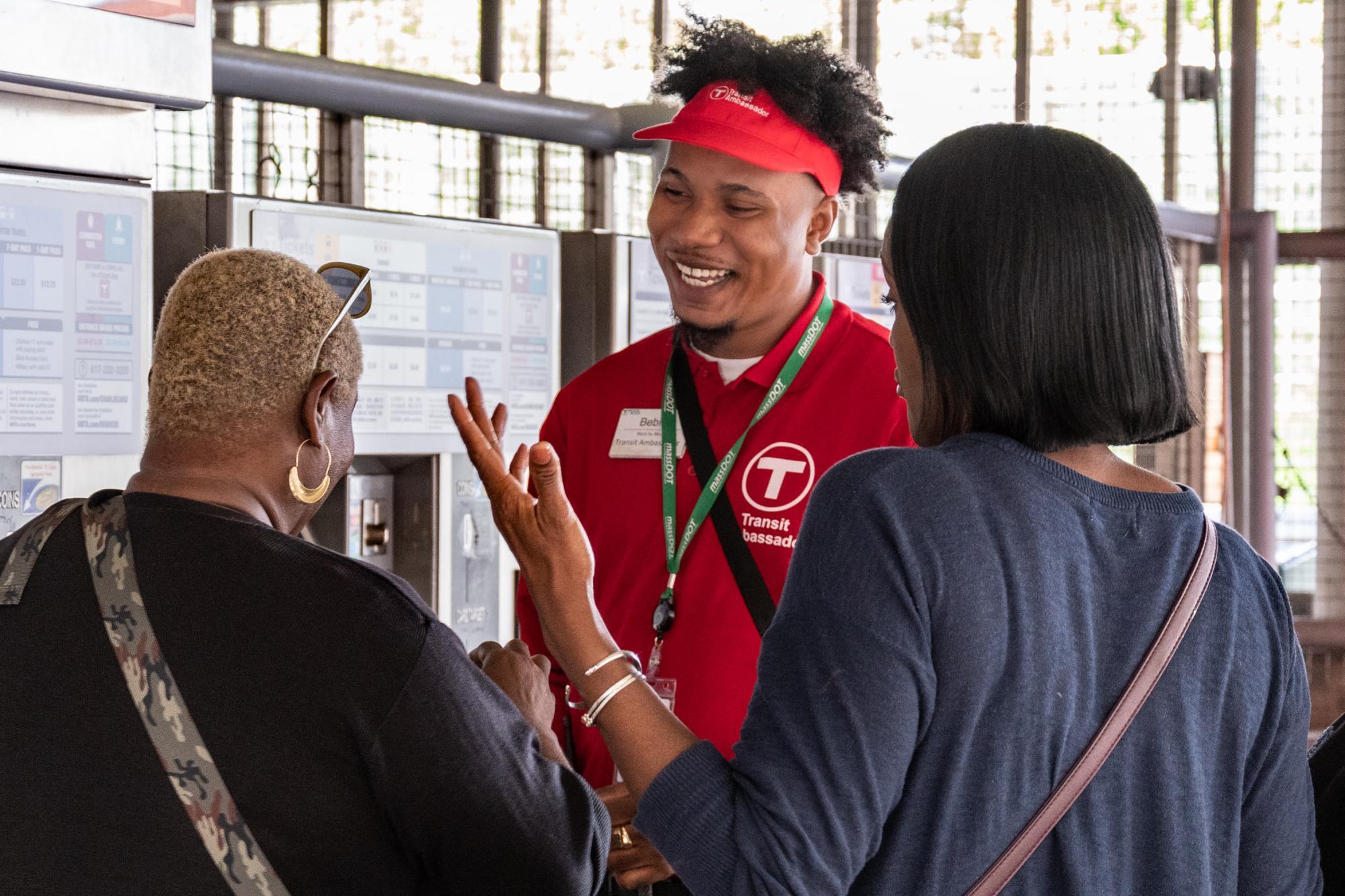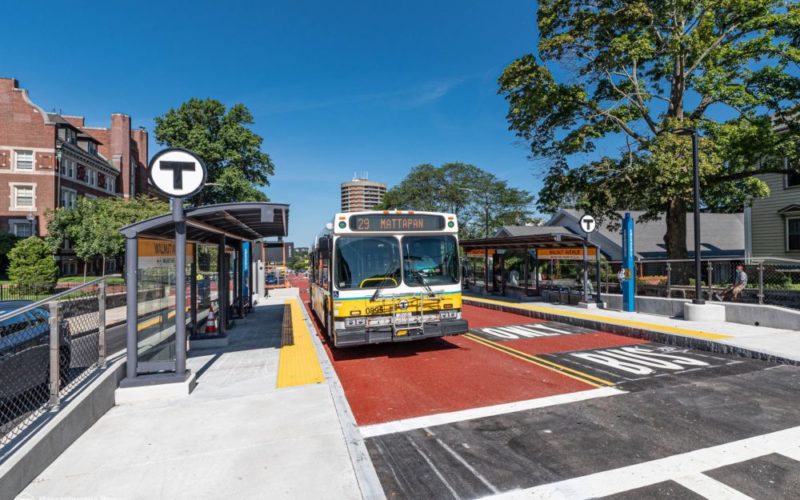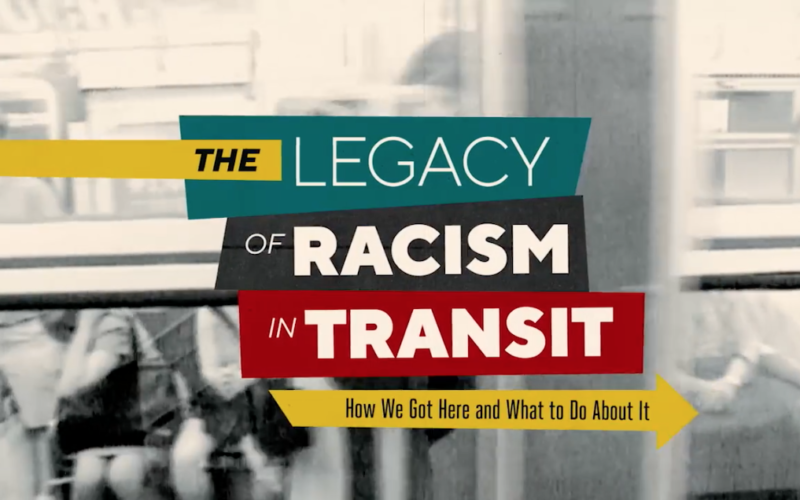
Photo: MBTA
In a new report, Safety for All, TransitCenter provides an overview of public safety reform efforts at U.S. transit agencies in response to the ongoing national reckoning over police brutality.
A heightened awareness of racial bias in policing and the damage caused by over-policing Black and brown neighborhoods has prompted several transit agencies to reevaluate their approach to public safety in recent years.
Safety For All chronicles how agencies like BART in San Francisco, TriMet in Portland, and SEPTA in Philadelphia are addressing safety concerns by hiring unarmed personnel, developing high profile anti-harassment campaigns, and better connecting vulnerable riders to housing and mental health services. These interventions also allow transit police to spend less time on “quality of life” offenses and focus more attention on the core mission of deterring violence.
Through this shift in resources and emphasis, agencies can limit interactions between riders and police, increase police accountability, and provide better support for vulnerable riders.
The report summarizes research on the safety concerns of transit riders and workers, and how the practice of transit policing in the U.S. has caused harm to many riders. The case studies and policy recommendations illuminate how agencies can address public safety on their systems while shedding the excesses of over-policing.
Findings include:
- Safety matters to riders – the perception that transit is unsafe discourages people from using it and has a negative impact on ridership. A 2016 survey of former LA Metro riders found that 29% cited personal safety concerns as the primary reason they stopped taking transit. Women and members of the LGBTQ community are the most likely to report feeling unsafe on transit.
- But an overly punitive approach to minor transgressions on transit has tremendous implications for riders of color, and Black riders in particular – Black adults are five times more likely to report being unfairly stopped by police than white adults. They are also more likely to be the victims of crimes, leading to doubts about the police’s ability to protect them from crime and harassment.
- In many transit systems, the punishment for fare evasion is much steeper than the punishment for a parking ticket – a similar offense. Not only are fare evasion penalties disproportionate to the infraction, but fare checks with such high stakes often provoke violent and deadly interactions between armed officers and transit riders.
- Police on many systems spend much of their time responding to low-level disturbances like fare evasion and unruly passengers. Reform efforts like hiring civilian fare inspectors, unarmed ambassadors, and social workers to intervene in these situations free up police officers’ time to focus on addressing violent crime.
- To create a genuine sense of safety on transit, agencies have been most successful when they partner with community groups and other government agencies to address social problems that spill over onto transit, like a lack of safe shelter, clean public restrooms, and mental health services.
The report recommends that transit agencies and police departments:
- Be transparent. Agencies should provide the public with data on use-of-force incidents and work with independent oversight bodies to investigate police misconduct and identify remedies.
- Listen to and learn from riders and community groups. After 2020’s Black Lives Matter protests, TriMet conducted community-led listening sessions to hear from local residents and frontline employees about their safety concerns on transit.
- Increase system presence through the use of unarmed personnel. Unarmed personnel should be used to check fares, enforce code of conduct violations, and play a customer service role. On SF BART, unarmed personnel patrol the system and alert transit police if a situation requires their assistance. A greater agency presence can increase the public’s sense of safety on transit systems.
- Work with outside partners to address homelessness and mental health crises. LA Metro has hired 40 full-time social workers to conduct outreach to riders in need of support services within its system. SEPTA partnered with local nonprofit Project HOME to create a drop-in center at its Center City concourse where vulnerable riders can access bathrooms, showers, food, and health services.
Learn more in the full Safety for All report.
 Announcing the 2021 Frequency Award Winners!
Announcing the 2021 Frequency Award Winners!
TransitCenter’s annual Frequency Awards recognize outstanding work in the transit field. Here are the 2021 honorees...
Read More New Video: The Legacy of Racism in Transit — How We Got Here and What to Do About It
New Video: The Legacy of Racism in Transit — How We Got Here and What to Do About It
To eliminate racial disparities in transit, we have to understand the influences of white flight, segregation, and discrimination on the formation of modern American transit systems. Our new video examines how those historical factors continue to shape transit today.
Read More